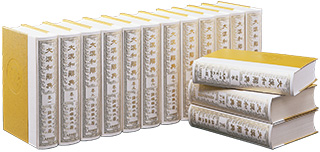JapanKnowledge
Dai Kanwa Jiten
(Great Chinese-Japanese Character Dictionary)
TAISHUKAN Publishing Co., Ltd.
- Jpn
- Eng

The highest achievement among Chinese-Japanese character dictionaries, containing 50,000 character entries and 530,000 compounds. All characters and vocabulary are searchable by full-text search.
Celebrated as the “great treasure trove of kanji culture,” the Dai Kanwa Jiten is a Chinese-Japanese character dictionary containing 50,000 character entries and 530,000 compounds, having scoured the existing literature and dictionaries, both ancient and modern. The vocabulary of every historical period is covered, including pre-Qin classics such as the Shijing (Classic of Poetry) and Lunyu (Analects of Confucius); chronicles such as the Shiji (Historical Records) and Hanshu (Book of Han); the Wen Xuan (Selections of Refined Literature); Tang and Son-dynasty poetry and prose, and novels from the Ming and Qing dynasties. The scope of consulted literature extends to Buddhist scripture, medicine and pharmacognosy, law, topography, and even Chinese poetry written in Japan.
This is one of the great representative dictionaries of Japan, which has long been widely utilized not only in universities and other research institutions, but also in temples and shrines for the assigning of posthumous Buddhist names and composing ritual prayers, and as a highly influential reference for identifying kanji during the formulation of Japanese character codes.
In the JapanKnowledge edition, not only can single Chinese-Japanese characters be searched by direct input, but also by radical, stroke count, or even from just a part of the character by using a character parts search. The approximately 376,000 items contained in the vocabulary index volume and the full text have also been digitized. As well as searches from the vocabulary’s character notation, reading, and character count, it is also possible to conduct full-text searches for character meanings, sources, and so on.
Compiler: Morohashi Tetsuji
Revisers: Kamata Tadashi, Yoneyama Torataro
Revisers: Kamata Tadashi, Yoneyama Torataro
Contents information
| Original books | 大漢和辞典 修訂第二版 |
|---|---|
| Publisher | TAISHUKAN Publishing Co., Ltd. |
| Publication date | First edition published in 1955, Vocabulary Index published in 1990, and Supplemental Volume published in 2000. |
| Number of volumes | 14 volumes (Volumes 1-12, a Vocabulary Index, and a Supplemental Volume) |
| Book price | ¥264,000 total (Pre-tax price ¥240,000+tax10%) |
| Release date | April 1, 2021 |
| Number of entries | 51,110 single character entries and 376,342 searchable vocabulary items |
| Number of characters | ― |
| About search | Advanced Search |
| Frequency of update | ― |
| Available services |
(as of Oct. 2025)